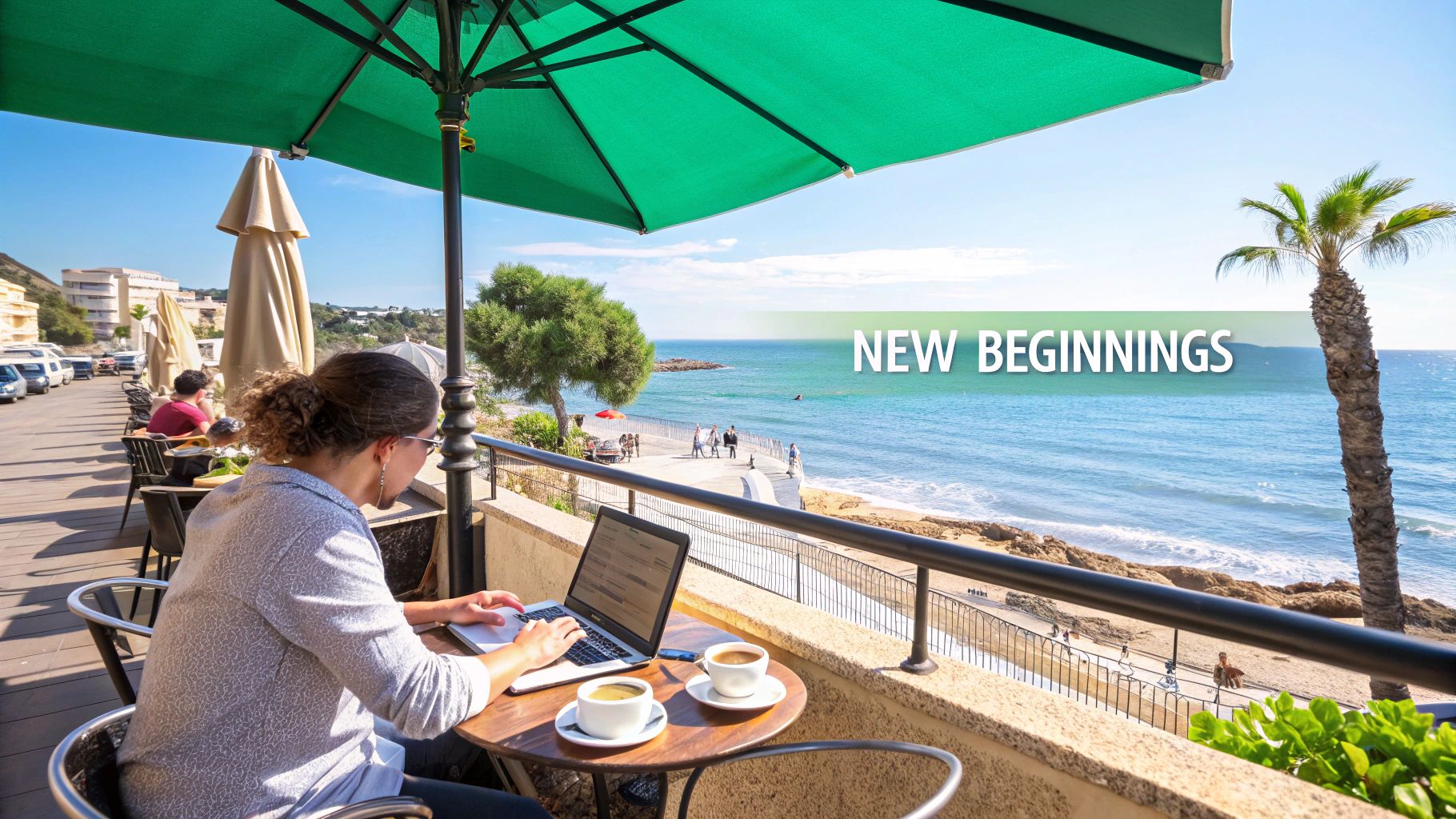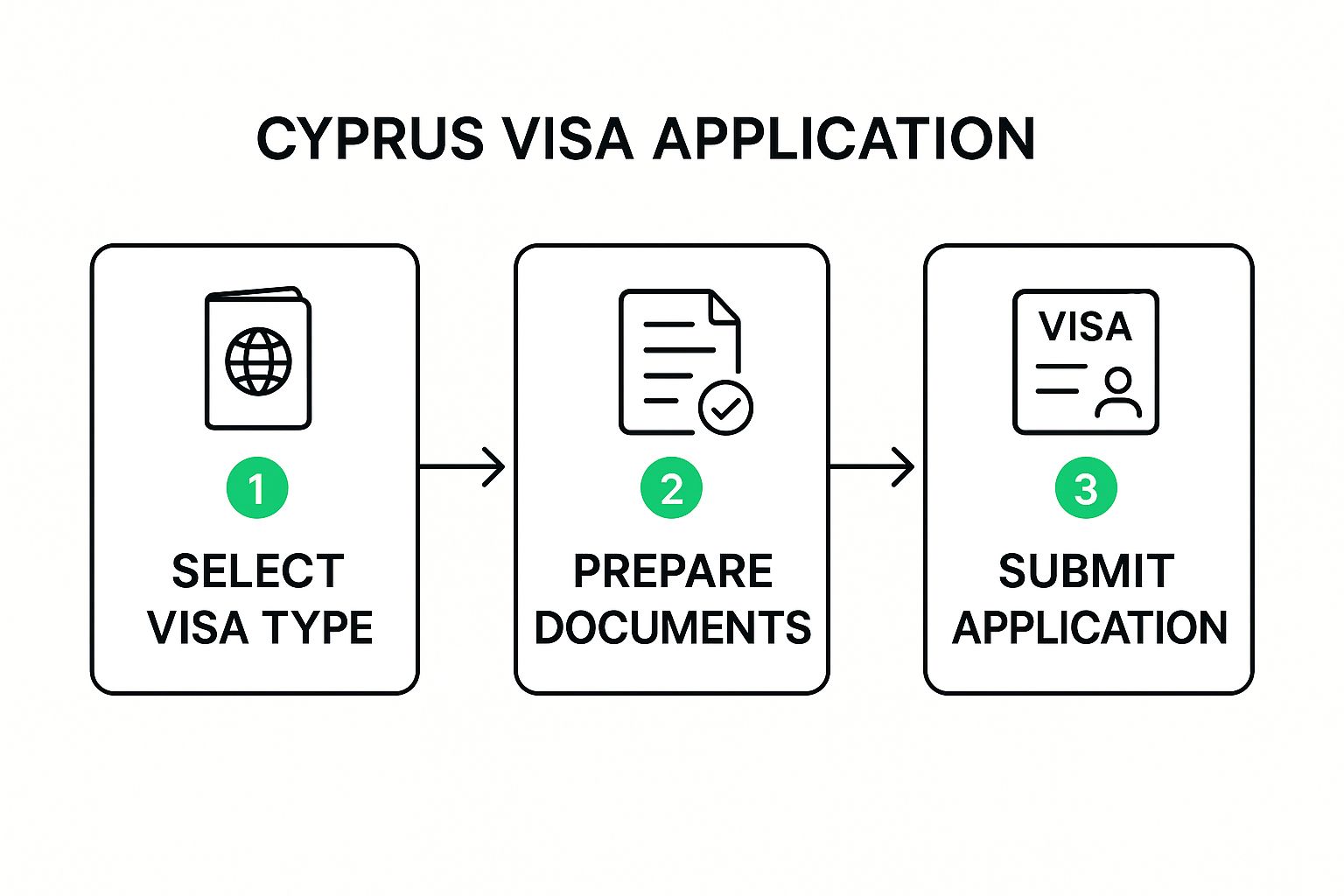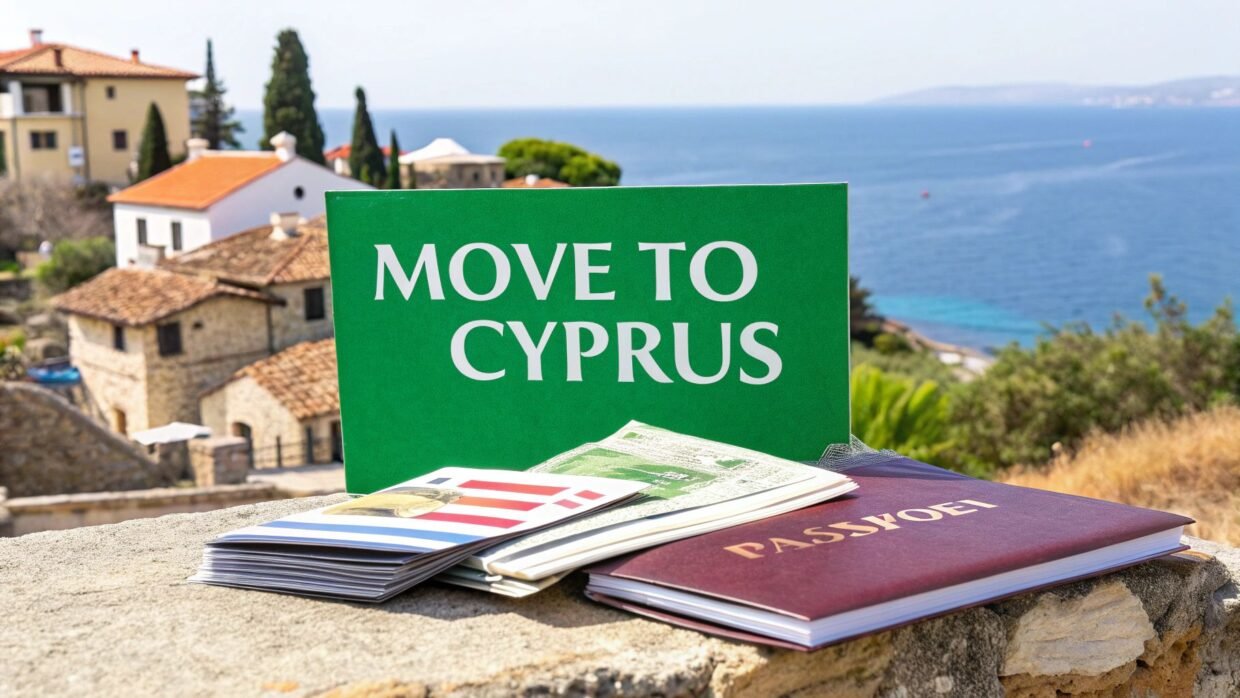Yes, you can absolutely move to Cyprus from the UK. The big change, of course, is Brexit. What used to be a simple hop over to a fellow EU country now involves a bit more paperwork. Since the UK left the EU, British citizens are now considered ‘third-country nationals’. This just means you'll need to go through the proper visa and residency channels, much like someone from the US or Australia would.
Think of it not as a barrier, but as a new process to follow. Let's walk through what that looks like on the ground.
The Reality of Moving to Cyprus From the UK Post-Brexit

The dream of a life filled with sunshine, halloumi, and stunning coastlines is still very much achievable for Brits. The key difference is that the spontaneous "pack up and go" approach is a thing of the past. A successful move now relies on good planning and a clear understanding of your new legal status in Cyprus.
Because the Republic of Cyprus is a proud member of the European Union, it now applies standard EU immigration rules to UK nationals. This brings it in line with how it treats citizens from other non-EU countries. If you'd like a refresher on its EU membership, our guide on whether Cyprus is in the EU is a great resource.
Understanding Your New Status
The fundamental shift is this: as a UK citizen, you no longer have an automatic right to live and work in Cyprus. You can still visit as a tourist for up to 90 days within any 180-day period without needing a visa. But for anything longer than that – for a proper move – you must apply for and secure a residency permit.
This means you’ll be dealing with Cyprus's Civil Registry and Migration Department. They’re the ones who handle all applications for stays beyond the 90-day tourist limit. So, when you're planning your move, you need to start gathering key documents, like proof of a steady income and comprehensive private health insurance, well in advance.
The main takeaway? Be diligent. The process is straightforward enough, but it absolutely requires you to be organised and prepared.
An Overview of Your Residency Options
We’ll dive into the specific visa types later on, but it helps to have a quick overview of the main pathways available to you. The best route depends entirely on your personal situation – are you retiring, seeking employment, or maybe even starting a new business?
Here are the most common routes for UK citizens:
- Temporary Residence Permit (Pink Slip): This is the typical first step for many expats. It's designed for people who are financially self-sufficient, making it a perfect fit for retirees or anyone with a reliable passive income. This permit lets you live in Cyprus for one year and is renewable.
- Permanent Residence Permit: This is the end goal if you're planning to make Cyprus your forever home. The Category F permit, for instance, is very popular with retirees who can show a stable annual income from sources outside Cyprus.
- Immigration Permit (Work Visa): If your plan is to work for a local company, you'll need a work permit. In most cases, the company that hires you will need to sponsor your application, proving that a local or EU citizen couldn't fill the role.
The most significant shift for anyone asking "can I move to Cyprus from the UK" is the need for proactive planning. Gone are the days of spontaneous relocation; a successful move now hinges on understanding the legal requirements and preparing your application well in advance.
To give you a clearer picture, I've put together a table that breaks down the most significant changes for UK citizens looking to make the move.
Key Changes for UK Citizens Moving to Cyprus Post-Brexit
This table summarises the core differences you'll face as a UK citizen moving to Cyprus now, compared to the freedom of movement you enjoyed before Brexit.
| Aspect | Pre-Brexit Status (As EU Citizen) | Post-Brexit Status (As Third-Country National) |
|---|---|---|
| Right to Reside | Automatic and unrestricted. | Requires a specific residency permit. |
| Right to Work | Unrestricted access to the job market. | Requires a work permit, usually tied to an employer. |
| Entry Process | Simple entry with a UK passport. | Visa-free for 90 days, then formal application needed. |
| Documentation | Minimal paperwork required. | Proof of income, health insurance, and other documents are mandatory. |
Understanding these distinctions is the first and most crucial step in planning your new life in Cyprus. With the right preparation, the process is entirely manageable.
Your Guide to Cyprus Visas and Residency Permits
Getting your visa and residency sorted is, without a doubt, the biggest hurdle to clear when moving to Cyprus from the UK. Since Brexit, British citizens are now considered third-country nationals. This means you can't just pack up and move; securing the right permit is absolutely essential. The system might look a bit daunting at first, but it's a well-trodden path with clear options tailored to your situation.
The trick is to figure out which permit matches your plans. Are you financially independent, maybe retiring or living on savings? Or are you coming over to work for a Cypriot company? Each path has its own specific requirements, and getting your head around them is the first task on your list.
This chart breaks down the main stages you'll go through, no matter which visa you're applying for.

As you can see, every application really comes down to three key actions: choosing the right permit, getting all your paperwork in order, and finally, submitting everything to the authorities.
The Temporary Residence Permit or "Pink Slip"
For most UK nationals making the move, the first stop is the Temporary Residence Permit, which almost everyone calls the "Pink Slip." It's the perfect fit if you're a non-EU citizen planning to stay in Cyprus for more than 90 days without working. It's especially popular with retirees and people who have a steady income from outside of Cyprus.
This permit is usually issued for one year and needs to be renewed annually. The most important condition is proving you can support yourself financially without taking a job in Cyprus. You'll need to show evidence of a stable and adequate income from sources abroad, like a pension, rental income from a UK property, or investment dividends.
On top of that, you must have comprehensive private health insurance that covers both inpatient and outpatient care in Cyprus. You'll also be required to open a local Cypriot bank account and deposit a decent sum to prove you're financially stable.
Pro Tip: Don't get hung up on the name 'Pink Slip'. The actual document you receive might not be pink at all! It's just the slang term expats have used for years to refer to the temporary residence permit. Just focus on its official name when dealing with the authorities.
Securing Permanent Residency
If you're truly committed to making Cyprus your forever home, then aiming for permanent residency is the logical next move. It gives you the right to live here indefinitely and saves you the yearly hassle of renewing a temporary permit. There are a few ways to get it, but one particular route is a firm favourite among British expats.
The Category F Permanent Residence Permit is specifically for people who are completely self-sufficient. To qualify, you must show a secure annual income of at least €9,568.14 for yourself, plus an extra €4,613.22 for each dependent family member. Critically, this income must originate from legal sources outside of Cyprus, such as pensions or investments.
While that income threshold might seem quite low, it's worth knowing that the immigration authorities much prefer to see applicants with a healthier financial buffer. They want to be sure you won't ever need to rely on the state. For a more detailed look at the specifics for all permit types, you can find a complete guide to getting a visa for Cyprus.
The Essential Document Checklist
No matter which permit you go for, your application's success really comes down to how well you prepare your paperwork. When you're dealing with the Civil Registry and Migration Department, you have to be meticulously organised. A single missing document or an incorrect form can cause long delays or even get your application rejected outright.
Here’s a rundown of the core documents you'll almost certainly need to gather:
- Valid Passport: Make sure it has at least six months of validity left on it.
- Proof of Income: This could be bank statements, pension slips, or investment portfolio reports showing your stable income from abroad.
- Proof of Accommodation: A rental contract or the title deeds to a property you've bought in Cyprus.
- Comprehensive Health Insurance: A policy providing full medical coverage in Cyprus.
- Clean Criminal Record Certificate: This is issued from the UK, usually an ACRO certificate.
- Bank Guarantee: A formal letter from a Cypriot bank confirming you've deposited a required amount (the exact figure can vary).
- Medical Certificate: A recent certificate from a doctor in Cyprus confirming you're clear of certain infectious diseases.
And a final, crucial tip: remember to get official translations for any documents that aren't in Greek or English. Many official UK documents, like your criminal record check, will also need to be apostilled in the UK before you can use them in Cyprus. This is a special stamp that authenticates the document for international use – don't overlook it
The Lifestyle Upgrade Drawing Brits to Cyprus

Let's be honest. While sorting out visas and residency is a crucial step, it's never the real reason people uproot their entire lives. The true pull of Cyprus is something far more profound. It's about consciously swapping the grey, high-stress rhythm of UK life for something slower, sunnier, and frankly, more human.
It’s a decision to prioritise well-being over the relentless grind. Think about it: trading a dark, rainy commute for a morning coffee on a sun-drenched balcony. This isn’t some holiday brochure fantasy; it’s the daily reality for thousands of Brits who’ve already made the move. The island’s famously relaxed pace, known to everyone here as "siga-siga" (slowly, slowly), has a way of seeping into your soul, calming the frantic energy many of us in the UK have just come to accept as normal.
Trading Stress for Sunshine and Space
The first and most powerful change you'll feel is the weather. It's hard to overstate the impact of having over 300 days of sunshine a year. Your entire daily routine shifts. Living outdoors becomes the default, not a rare, celebrated event.
Suddenly, weekend plans are no longer held hostage by a dreary forecast. Instead, they’re about spontaneous beach trips, hikes in the mountains, or long, leisurely lunches at a village taverna. This naturally nudges you towards a healthier, more active lifestyle. You’re simply more inclined to go for an evening stroll along the Paphos sea front or explore the Troodos Mountain trails when the weather is on your side.
"For many, the move isn't just about changing location; it's about reclaiming time. The hours once lost to traffic jams and packed trains are transformed into time for family, hobbies, or simply relaxing by the pool. It’s a complete rebalancing of life's priorities."
The daily commute is a perfect illustration. A major driver for Brits moving to Cyprus is escaping the UK's soul-crushing travel times, where journeys in big cities often top 50 minutes each way. Here, even in bustling Limassol or Nicosia, getting around is far less of an ordeal. This frees up a huge chunk of your day, directly boosting your quality of life. You can discover more about what’s fuelling this trend and see how the appeal of sunlit courtyards is replacing rainy commutes for Brits.
A More Affordable Quality of Life
Beyond the glorious weather, a tangible improvement often comes from the lower cost of living. While Cyprus is by no means a bargain-basement destination, most find their money stretches considerably further, unlocking a lifestyle that might feel out of reach back home.
Take a common real-world scenario. A couple renting a small flat in a London suburb might be grappling with sky-high rent and council tax, with very little left over at the end of the month. In Cyprus, that same budget could easily secure a spacious apartment with a shared pool, or perhaps even a small villa with a garden in a coastal town like Paphos. This isn’t an exaggeration; it’s a story we hear time and time again.
Here's how that might look in your day-to-day life:
- Dining Out: A delicious meal at a local taverna becomes a regular, affordable pleasure, not a once-in-a-while treat.
- Property: Your housing budget simply buys more—more space, better amenities, and often, proximity to the sea.
- Leisure: With more disposable income and free time, hobbies and socialising can become a much bigger part of your week.
This financial breathing space is a massive stress-reducer. It's the difference between just about getting by and actually living well. When you combine that with a community-focused culture, a work-life balance that truly values 'life', and the sheer joy of the Mediterranean climate, it's easy to see why so many people asking "can I move to Cyprus from the UK?" find the answer is a resounding 'yes'.
Sorting Out Your Finances for the Move to Cyprus
A successful move from the UK to Cyprus is about more than just finding a sunny spot to live; it's grounded in solid financial preparation. Getting to grips with the local economy is a must, and the good news is that Cyprus presents some genuinely attractive advantages that can give your finances a healthy boost compared to life back in the UK.
The differences in the tax systems are probably the most significant benefit you'll notice. Cyprus has worked hard to create a favourable tax regime to encourage foreign investment and attract new residents. This proactive stance offers real, tangible savings for UK expats, whether you're running a business, enjoying your retirement, or living on investment income.
Making the Most of Cyprus's Tax System
The tax environment in Cyprus is a huge draw, especially when you compare it directly with the UK. For anyone running a business, Cyprus offers one of the lowest corporate tax rates you'll find anywhere in the European Union.
- Corporate Tax: You're looking at a flat rate of just 12.5% on profits. That's a world away from the UK's much steeper 25%.
- Inheritance Tax: This is a big one. Cyprus has done away with inheritance tax completely. Your assets can pass to your loved ones without the hefty 40% charge they could face in the UK.
- Dividend and Interest Income: If you qualify as a tax-resident non-domiciled individual (which most UK expats do), you won't pay any tax on your dividend or interest income.
Cyprus offers some serious financial perks for UK expats. The 12.5% corporate tax rate is a standout, far more appealing than the UK's 25%. Plus, there's no inheritance tax, no capital gains tax for non-residents, and no tax on dividends for those with non-domiciled status—a stark contrast to UK dividend tax rates that can climb as high as 39.35%. You can dig deeper into these attractive tax benefits for UK movers on Astons.com.
This Non-Domiciled Tax Status, often just called "Non-Dom," is a complete game-changer for many people. If you become a tax resident in Cyprus but weren't born here and haven’t lived here for 17 of the last 20 years, you can be exempt from tax on your worldwide dividend and interest income. It's an incredibly powerful tool for managing your finances, particularly if you have an investment portfolio.
Comparing the Day-to-Day Cost of Living
While the tax advantages are a massive plus, it's your daily spending where you'll feel the most immediate financial impact. Of course, major hubs like Limassol come with a higher price tag, but many people find their overall cost of living is noticeably lower than back home in the UK.
For instance, you’ll likely see a pleasant drop in your monthly grocery bill for a couple. Eating out at a local taverna becomes an affordable regular treat rather than a once-in-a-blue-moon occasion. Utility bills like water and electricity are generally reasonable, though you'll want to budget for higher electricity costs in the peak of summer when the air conditioning is working overtime. For a more detailed breakdown of everyday expenses, check out our guide on whether Cyprus is expensive.
Getting Your Cyprus Finances in Order
Putting your financial house in order should be at the top of your to-do list when you arrive. Opening a local bank account isn't just a good idea; it’s a non-negotiable step. You'll need it for your residency application and for all the basics of daily life, like paying bills and getting paid.
To get an account set up, you'll generally need to show up with:
- Your passport
- Proof of your address in Cyprus (a rental agreement works perfectly)
- A recent utility bill from your old UK address
- A reference letter from your UK bank
Once your Cypriot account is up and running, think carefully about how you'll transfer your money from the UK. Your high-street bank can do it, but you'll almost always get a much better exchange rate and lower fees from a specialist currency exchange service. This can save you thousands of pounds, especially on large transfers for a property purchase or initial setup funds. It's well worth doing your research and comparing these services before you make the move.
Getting Your New Life in Cyprus Started

Once the formal paperwork is behind you, the real adventure begins: setting up your home and daily life on the island. This is when the dream of living in Cyprus starts to feel tangible, moving from paperwork to picking out furniture and finding your favourite local café.
It’s all about the practical stuff now. You’ll be finding a place to live, figuring out the healthcare system, and sorting out all the little details that make life run smoothly. Let’s walk through what you need to know.
Navigating the Cypriot Property Market
Finding the right place to live is probably the biggest piece of the puzzle when you first arrive. Whether you’re looking to rent for a while or buy your forever home, the property market here has its own quirks.
If you're renting, you’ll find the market moves pretty quickly, especially in hotspots like Paphos and Limassol. Properties pop up on local websites and with estate agents, but when you spot one you like, you need to be ready to go. You'll generally need a security deposit (one month's rent) plus the first month's rent upfront. Budgeting around €1,500 should comfortably cover these initial costs for a good-quality flat.
For those looking to buy, my strongest piece of advice is to get a reputable, independent lawyer on your side. It's not just a good idea; it's absolutely vital. They'll do the due diligence, check the property's title deeds are clean, and scrutinise every line of the contract. Never, ever sign anything before your lawyer gives you the green light. It’s a simple rule that can save you a world of pain and money.
A top tip from those who've been there: don't just stick to the internet. Get in the car and drive around the neighbourhoods you’re interested in. You’ll often spot 'For Rent' or 'For Sale' signs (Πωλείται / Ενοικιάζεται) on properties that are nowhere to be found online. It’s a great way to uncover some hidden gems.
Understanding the Healthcare System
For any Brit moving to Cyprus, sorting out health insurance is non-negotiable—it's a requirement for your residency application. Before you can even apply for that first temporary residence permit, you must have a private health insurance policy in place.
This initial policy needs to cover both inpatient and outpatient treatment. You can find basic plans for between €200 and €400 per person for the year. Think of it as an essential safety net that covers you from the moment you land.
Later on, once you’re officially a resident and contributing to social insurance (either as an employee or through self-employment), you can look at joining the national healthcare system, GeSY (the General Healthcare System). GeSY gives you access to GPs, specialists, and hospital care for a small co-payment. That said, many long-term expats still keep a basic private plan running alongside GeSY for quicker access to certain specialists and that extra bit of reassurance.
The Essential To-Do List for Settling In
Beyond finding a home and getting healthcare sorted, a few other practical tasks will make your transition to Cypriot life that much easier. Getting these ticked off your list early will help you feel properly settled in no time.
Key Admin Tasks to Tackle:
- Swap Your Driving Licence: After you've been living in Cyprus for six months, you need to exchange your UK licence for a Cypriot one. It's a pretty straightforward process you can do at the Department of Transport or a local Citizen Service Centre (KEP).
- Register Your Car: If you're importing your car from the UK, it needs to be registered here. This involves a fair bit of paperwork, a customs inspection, and paying import duties. Just be warned, it can be a surprisingly complicated and sometimes pricey affair.
- Get Utilities Connected: Your landlord or estate agent can usually give you a hand with getting the electricity and water bills switched over to your name. You’ll just need your rental contract, some ID, and you might have to pay a deposit.
- Get Connected: Setting up a mobile phone and home internet is a breeze. Providers like Cyta, Epic, and Primetel have shops on most high streets. Just pop in with your passport and proof of address, and they’ll get you sorted with a package.
Schooling Options for Families
Moving with children? Figuring out their education will naturally be at the top of your list. The great news is that Cyprus offers a fantastic selection of both public and private schools.
Public schools teach in Greek, which is an amazing opportunity for younger kids to become truly bilingual and immerse themselves in the local culture. For many UK families, however, private international schools are the preferred choice. These schools almost always follow the British curriculum, offering IGCSEs and A-Levels, which ensures a smooth transition and simplifies applications to UK universities down the line. You'll find the best of these schools clustered around the main cities—Nicosia, Limassol, Paphos, and Larnaca.
Common Questions About Moving to Cyprus
Even with a solid plan, a few lingering questions always pop up when you’re planning a move as big as this one. To put your mind at ease, I've pulled together the most common queries we hear from Brits getting ready for their new life in Cyprus. Think of this as a quick-fire round to tackle those practical details.
How Much Money Do I Realistically Need to Move?
This is the million-dollar question, isn't it? While there’s no single magic number, a good rule of thumb for a single person or a couple is to have around £10,000 set aside. That figure gives you a comfortable buffer for all the initial setup costs, not including buying a property.
So, where does that money go? It's easy to underestimate the upfront expenses. You’ve got visa application fees, the cost of getting UK documents like police clearance certificates officially apostilled, and the medical checks you'll need for residency. On top of that, there are the more obvious moving day costs.
- Shipping Your Life: Getting the contents of a typical 3-bedroom house over in a 20ft container will set you back about £3,390 on average.
- Securing a Rental: You'll almost certainly need one month's rent as a security deposit, plus your first month's rent upfront. Budgeting around €1,500 for this is a sensible move.
- Initial Health Insurance: A basic private policy, which is mandatory for your visa application, costs between €200 and €400 per person for the year.
Tallying these up shows how quickly costs can mount. Having that initial pot of money ready means you can handle everything without the financial stress, making the whole process much smoother.
Can I Bring My Pet with Me from the UK?
Absolutely! Bringing your furry family members to Cyprus is very common and the process is refreshingly straightforward, provided you tick all the boxes. Your pet will need to be microchipped, have a valid rabies vaccination, and be issued an official pet passport or, more commonly now, an Animal Health Certificate (AHC) from a vet in the UK.
The cost can vary quite a bit, anywhere from £300 to £1,500, depending on your pet’s size and which airline you fly with. It's absolutely crucial to check the specific requirements of your airline well ahead of time, as some have strict rules on breeds and the type of carrier they'll accept.
Is English Widely Spoken in Cyprus?
Honestly, you'll have no trouble at all getting by with English. In the main towns and tourist hubs like Paphos, Limassol, and Larnaca, English is spoken pretty much everywhere. It's a legacy of the island's long history with Britain, combined with its modern, booming tourism industry. You’ll see it on road signs, in restaurants, and even on official forms, which are often provided in both Greek and English.
That being said, while you can live here comfortably without speaking a word of Greek, making an effort is massively appreciated. Learning a few simple phrases shows respect for the culture and will definitely get you a warm smile. "Yia sas" (hello) and "Efharisto" (thank you) are a great place to start.
This widespread use of English really smooths the landing for Brits moving over, removing one of the biggest barriers you might face when relocating to another European country.
What Is the Job Market Like for UK Expats?
I'll be frank: finding a job in Cyprus can be tough. Since Brexit, UK citizens are third-country nationals, and employers have to prove they can’t find a suitable candidate from Cyprus or the EU first. The sectors with the most opportunities for expats tend to be tourism, IT, and finance, where specialised skills are often in demand.
The average annual salary in Cyprus sits somewhere between €22,800 and €26,400. You'll generally find the highest wages in Limassol, which has really cemented itself as the island's main business centre. Unless you have highly sought-after skills or are being transferred by your UK company, it’s a very good idea to have a job offer locked in before you pack your bags. Many Brits who move here are either retired or financially self-sufficient, allowing them to sidestep the local job hunt altogether.
At SayCyprus, we're passionate about helping you discover every corner of this incredible island. Whether you're planning your big move or just a holiday, find all the insider tips and local secrets you need at https://www.saycyprus.com.












